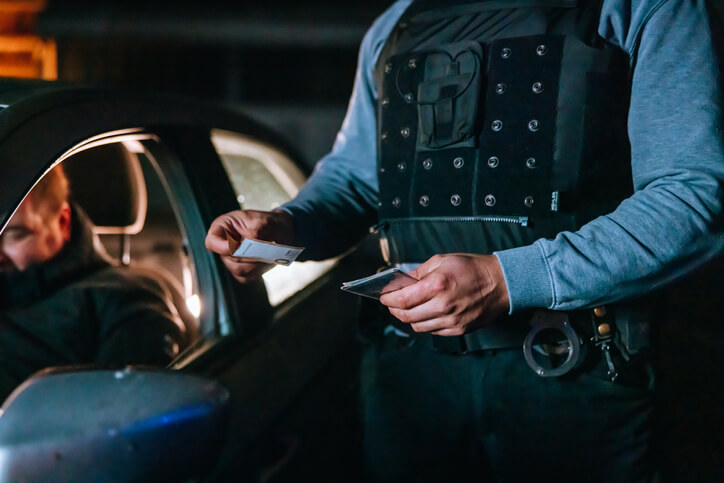Getting a traffic ticket is one of the most unpleasant aspects of driving a motor vehicle in New York. Our law enforcement is on the roads every day, pulling over motorists for various infractions ranging from speeding and equipment violations to reckless driving and DWI. Aside from the stress involved, you also have the financial burden of having to pay a fine or fight a ticket. One thing that New York also has is a system of points on a driver’s license. Most traffic tickets cause the driver to incur points that, when added up, can lead to a suspension of driving privileges. Unfortunately, most drivers are unaware or confused by the NYS points on the driver’s license system. Navigating this system can be fraught with peril, as this can also impact your auto insurance and cause you to incur further expenses.
How does the NYS driver’s license point system work?
Basically, most traffic tickets have a point value attached to them. These points are not charged against your license unless and until you are convicted of the violation or have pled guilty to the ticket. Once these points are added to your license, they are totaled up over an 18-month period. If you have received 11 points in any 18-month period, your driver’s license will be suspended. So, each time you are convicted of a traffic infraction, you will come closer to a license suspension.
Speeding
The most common traffic ticket is for speeding. Driving above the posted speed limit is the surest way to get yourself pulled over. In addition, the points for speeding depend on how much over the speed limit you were driving.
If you are ticketed for going up to 10 miles over the speed limit, or if the police officer couldn’t determine the specific amount, then you will receive 3 points on your license. Going from 11 to 20 miles over the speed limit will result in 4 points, you get 6 points for up to an excess of 30 miles per hour, and 8 points for up to 40 miles per hour over the limit. If you are convicted of driving 40 miles per hour over the speed limit, you will receive 11 points and an automatic license suspension. This is the largest point total for any specific violation.
Reckless and negligent driving
Many car accidents are caused each year by drivers not obeying the traffic laws. As a result, the NYS point system for reckless and negligent driving can be particularly harsh. For example, a reckless driving conviction will add 5 points to your license. The same is true for failing to stop for a school bus. This is to protect the young students going to or returning home from school. Trying to cross a railroad crossing with the gate down is not only an incredibly stupid and risky thing to do, but it will also cost you 5 points. A recent New York law outlawed the use of a cell phone for calls or texting unless using a hands-free system. This violation is also 5 points.
You can also get points for other moving violations. 3 points will be added to your license for going through a red light, not stopping or yielding at a posted sign, driving on the wrong side of the road, or leaving the scene of an accident. Making an improper turn, failing to signal before turning or changing lanes, and most other moving violations will add 2 points to your license. If you are a particularly negligent driver, these points can add up quickly.
Equipment violations
If you have a passenger under 16 who is not wearing a seatbelt, you can be given a ticket that incurs 3 points. The same goes for not having a child in a proper safety seat. You can also get 2 points for having inadequate brakes on your car. This is why you should listen to your technician the next time he or she tells you that your brake pads are too thin.
Many equipment violations don’t yield points but still can get you a costly ticket that can affect your insurance rates. These include having improperly tinted windows, faulty taillights, or an expired registration or inspection sticker.
Foreign tickets
In general, if you receive a traffic ticket in another state or country, this will not impact your NYS point total. You will still have to pay a fine and the ticket will be reported to your insurance company. The only exception is that New York has a reciprocity agreement with the Canadian provinces of Quebec and Ontario. If you cross the border and get a ticket, you may also incur points in New York.
The New York Driver Responsibility Program
If you receive 6 points or more in any 18-month period, you will be subject to an additional penalty called the New York Driver Responsibility Program. This also applies to drivers convicted of a DWI or a drug-related traffic violation or refused a chemical test. The penalty lasts for three years and will cost a minimum of $100 per year. The penalty increases by $25 per year for each point incurred over 6 points. Those with DWI-related penalties have to pay $250 per year.
Automobile insurance
Each auto insurance company has its own way of dealing with traffic tickets. This includes assessing points. Nevertheless, even tickets that do not incur points will be reported to your insurance company. This could lead to increases in your annual premium and a potential denial of coverage in the future.
Call us if you have received a traffic ticket
One of the best ways to avoid incurring points is by fighting your traffic tickets. The Law Firm of Michael A. Arbeit, P.C., has strong experience defending drivers in New York who have received traffic tickets. If you have received a traffic ticket or have questions about the points you may have previously incurred, call our firm today.

